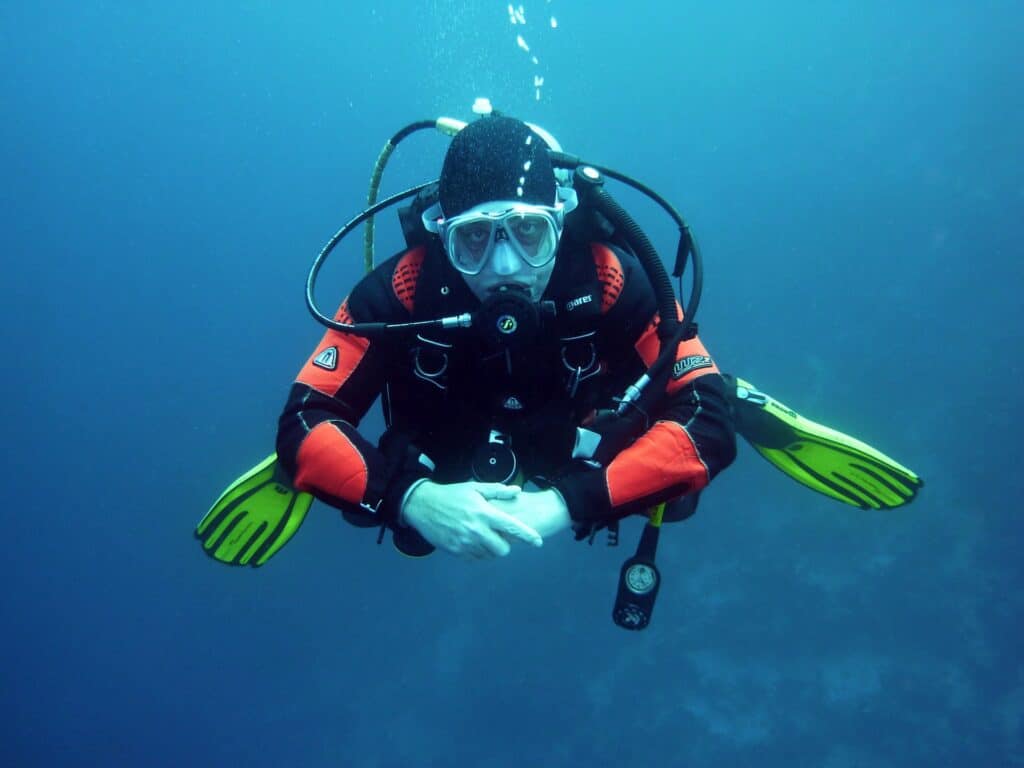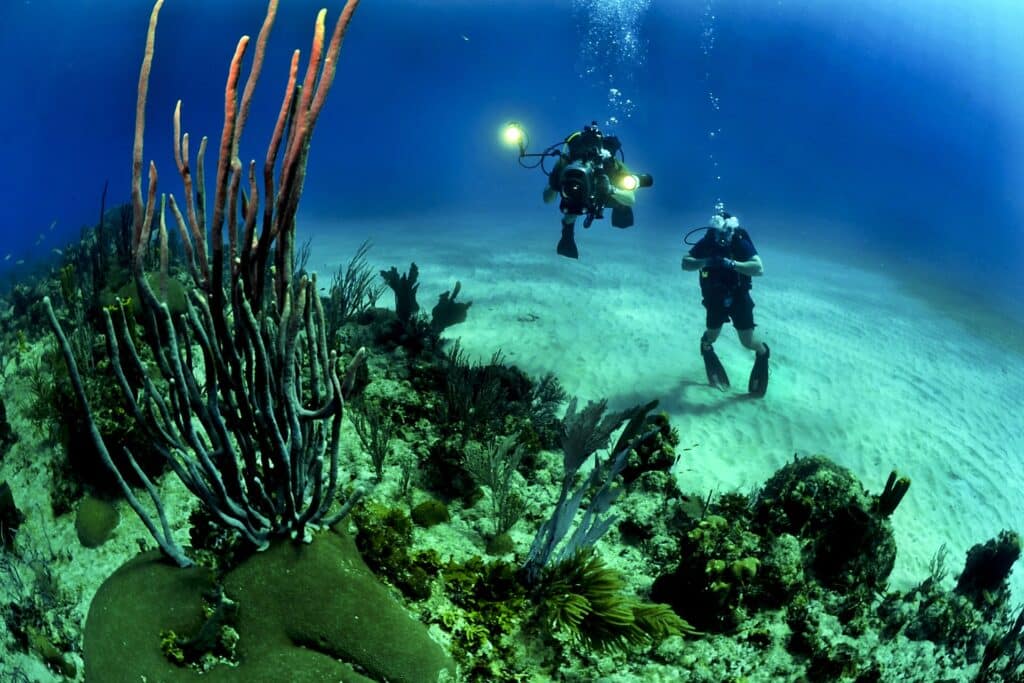The underwater world is both mysterious and interesting to most of us but not having a professional diver to guide us through the whole diving process would be a life threatening experience.
This blog dives deep into the essential aspects of hiring a commercial diver. From deciphering the key qualifications and certifications that define a competent diver to evaluating their commitment to safety and their capacity to excel under pressure, we delve into the intricacies that set exceptional divers apart. With insights into effective interview strategies, reference checks, and the significance of tailored onboarding processes, recruiters will find themselves well-equipped to navigate the dynamic waters of hiring commercial divers.
Understanding the role of a commercial diver
In the realm of industrial and marine operations, commercial divers play a pivotal role in undertaking a wide array of underwater tasks that range from inspection and maintenance to construction and salvage. These skilled professionals are the backbone of projects that require human intervention beneath the water’s surface, ensuring the successful execution of tasks that machines simply cannot replicate.
Commercial divers are equipped with specialized training, expertise, and equipment to navigate the challenges of working in underwater environments. Their responsibilities encompass tasks such as underwater welding, structural inspections, pipeline installations, and even marine research. Recruiters seeking to hire commercial divers must recognize the diverse nature of their work, requiring candidates to possess a unique blend of physical endurance, technical proficiency, and problem-solving aptitude.
From offshore oil rigs to shipyards and underwater research facilities, commercial divers bring a valuable skill set to industries that depend on submerged operations. As recruiters, it’s crucial to comprehend the demanding nature of their role, the necessary qualifications and certifications, and the safety protocols they adhere to. By gaining a comprehensive understanding of the multifaceted responsibilities that commercial divers undertake, recruiters can better assess candidates and match them with the specific requirements of their projects. This subheading provides a foundational insight into the integral role of commercial divers, setting the stage for informed and effective recruitment practices within this specialized field.
Key qualifications and certifications
When hiring a commercial diver, identifying the right qualifications and certifications is paramount to ensure that the candidate is well-prepared for the unique challenges of underwater work. Recruiters must carefully assess these aspects to guarantee not only the safety of the diver but also the success of the project.
First and foremost, a valid certification from a recognized diving association, such as the Association of Commercial Diving Educators (ACDE) or the International Marine Contractors Association (IMCA), is non-negotiable. This certification attests to the diver’s completion of rigorous training in dive procedures, safety protocols, and emergency response.
Moreover, specialized certifications relevant to the specific tasks at hand should be closely examined. For instance, if the project involves underwater welding or cutting, a certified welder qualification is essential. Similarly, certifications in underwater inspection techniques or equipment operation showcase the diver’s expertise in their designated area.
Beyond certifications, recruiters should also scrutinize the diver’s experience in relation to the project’s demands. Years of practical experience in various underwater environments, coupled with a track record of successful projects, demonstrate a candidate’s competence and adaptability.
In essence, a thorough evaluation of qualifications and certifications allows recruiters to identify divers who possess the technical proficiency and industry knowledge required for efficient and safe underwater operations. This meticulous approach ensures that the selected commercial diver is equipped to handle the complexities of their role, contributing to the seamless execution of underwater projects.
Evaluating a diver’s commitment to safe practices
Safety is paramount in the world of commercial diving, and a diver’s commitment to adhering to rigorous safety practices is a crucial consideration during the recruitment process. Recruiters must prioritize candidates who not only possess technical expertise but also demonstrate an unwavering dedication to maintaining a secure underwater work environment.
A prospective commercial diver’s safety training background should be a focal point of evaluation. This includes assessing their familiarity with dive tables, decompression protocols, emergency response procedures, and equipment maintenance for life support systems. A strong emphasis on these aspects signifies a candidate’s preparedness to handle unexpected challenges while minimizing risks.
Candidates who have participated in advanced safety training courses, such as those covering dive accident management or hazardous materials handling, showcase a proactive approach to their profession’s safety requirements. Their ability to anticipate potential hazards and react effectively can greatly contribute to incident prevention.
Recruiters should inquire about a candidate’s history of adhering to safety regulations and their role in promoting safety within previous projects. Strong endorsements from past employers or colleagues further underscore a diver’s commitment to maintaining a secure work environment.
Ultimately, the commitment to safety training underscores a diver’s professionalism and responsibility. By selecting candidates who prioritize safety in their approach, recruiters not only contribute to the welfare of their team but also enhance the overall success of underwater projects by mitigating risks and ensuring a secure working environment.
Assessing physical and mental fitness
The demanding nature of commercial diving necessitates candidates who possess both exceptional physical endurance and robust mental faculties. As recruiters, evaluating a diver’s physical and mental fitness is paramount to ensure their capability to excel in the challenging underwater environment.
Physical fitness is a fundamental requirement for a commercial diver. Stamina, strength, and agility are crucial to performing tasks effectively while contending with the added resistance of water pressure. Assessing a candidate’s overall physical health, cardiovascular endurance, and muscular strength provides insights into their ability to work efficiently and safely.
Equally important is a diver’s mental fitness. The underwater environment presents unique stressors that can impact decision-making and concentration. Recruiters should gauge a candidate’s ability to remain calm under pressure, adhere to protocols, and make sound judgments. Strong communication skills are also essential for effective team coordination and emergency response.
Candidates who have a track record of completing physically demanding activities or challenging projects demonstrate their capacity to handle the rigors of commercial diving. Furthermore, assessing a candidate’s mental resilience through behavioral assessments or scenario-based interviews provides valuable insights into their adaptability and problem-solving skills.
In essence, evaluating a diver’s physical and mental fitness with a commercial diver test ensures that they are not only equipped to execute their tasks competently but are also well-prepared to face the unique challenges of the underwater world. This comprehensive assessment contributes to the selection of divers who can excel in their roles while upholding safety and performance standards.

Conducting effective interviews
Interviews play a pivotal role in gauging a candidate’s suitability for the demanding role of a commercial diver. Crafting insightful questions ensures recruiters obtain a comprehensive understanding of a candidate’s qualifications, experience, and approach to their profession.
Diverse Experience: “Can you share instances where you’ve worked in varied underwater conditions? How did you adapt to challenges specific to each environment?”
Safety Focus: “Describe your approach to ensuring safety during underwater operations. How do you handle unexpected safety risks?”
Emergency Response: “Walk us through a situation where you had to respond to an emergency underwater. How did you manage the situation, and what was the outcome?”
Team Collaboration: “How do you communicate and coordinate with team members during underwater tasks? Can you provide an example of a successful team project?”
Equipment Proficiency: “What types of specialized diving equipment are you experienced in operating? How do you ensure proper maintenance and function?”
Decision-making Under Pressure: “Tell us about a scenario where you had to make a quick decision while underwater. How did you approach it, and what was the result?”
Problem-solving Skills: “Share an instance where you encountered a technical issue during a dive. How did you troubleshoot the problem and continue with the task?”
Adaptability: “How do you stay up-to-date with advancements in diving techniques and technology? Can you provide an example of how you adapted to a new methodology?”
Physical and Mental Preparation: “What physical training do you undertake to maintain your diving readiness? How do you mentally prepare for challenging dives?”
Project Contributions: “In your previous roles, what innovative solutions or improvements did you introduce that positively impacted the success of the project?”
By asking these targeted questions, recruiters can delve into a candidate’s professional background, mindset, and capabilities, enabling them to make informed decisions and select commercial divers who are well-equipped to excel in their roles.
Ensuring reliability and competence
A candidate’s work history and references provide invaluable insights into their competence, work ethic, and reliability as a commercial diver. Recruiters must rigorously assess this information to verify qualifications and gain a deeper understanding of a candidate’s performance in real-world scenarios.
Begin by contacting the candidate’s previous employers or supervisors. Inquire about the candidate’s role, responsibilities, and the projects they were involved in. Ask about their ability to work as part of a team, handle challenges, and adhere to safety protocols.
Furthermore, request details about the candidate’s performance during critical situations or emergencies. How did they contribute to problem-solving, and how effectively did they communicate with the team? These responses offer an understanding of the candidate’s level of composure and adaptability.
Request samples of the candidate’s previous work, such as reports, documentation, or project summaries. Reviewing these materials allows you to assess the quality of their work, attention to detail, and documentation skills.
By thoroughly examining references and previous work, recruiters can corroborate the information provided by candidates and ensure they possess the skills and experience necessary for the role. This due diligence safeguards against potential discrepancies and guarantees that the selected commercial diver can uphold the standards of excellence demanded by underwater operations.
Tailoring your hiring process for specialized projects
The world of commercial diving encompasses a wide array of industries, each with its own unique demands and requirements. As recruiters, adapting your hiring process to address industry-specific needs is pivotal for identifying candidates who possess the precise skill set and expertise necessary for specialized projects.
Start by familiarizing yourself with the specific requirements of the industry in which the commercial diver will operate. Whether it’s offshore energy, underwater construction, marine research, or environmental assessments, understanding the nuances of the industry provides a foundation for tailored evaluation.
Craft interview questions that address the particular challenges and objectives of the industry. Probe into a candidate’s familiarity with industry-specific regulations, technologies, and methodologies. Inquire about their previous experiences that align with the industry’s demands.
Assess the candidate’s ability to adapt to the unique conditions of the industry. For instance, if the project involves deep-sea exploration, prioritize divers with experience in high-pressure environments and extended decompression procedures.
Collaborate with industry experts or consultants to gain insights into the qualifications and traits that are highly valued within that sector. This collaboration ensures your hiring process aligns with current industry trends and needs.
By customizing your hiring process to suit industry-specific requirements, recruiters can confidently select commercial divers who possess the expertise to excel in their designated fields. This strategic approach contributes to the success of projects while aligning with the specialized nature of underwater operations within diverse industries.

Integrating your new diver into the Team
Welcoming a new commercial diver into your team goes beyond just filling a position; it’s about ensuring a smooth transition and fostering a cohesive and productive work environment. The onboarding process plays a pivotal role in acclimating the diver to the team’s culture, expectations, and operational procedures.
Begin by providing a comprehensive orientation that covers company policies, safety protocols, and the team’s mission and values. This establishes a foundation of shared understanding and reinforces the commitment to safety and excellence.
Assign a mentor or a seasoned diver to guide the new recruit during their initial days. This mentorship ensures a quicker integration into the team by providing insights into team dynamics, communication norms, and practical tips.
Facilitate hands-on training sessions to familiarize the new diver with specialized equipment, tools, and techniques relevant to the job. Hands-on experience boosts confidence and helps bridge the gap between theoretical knowledge and practical application.
Encourage open communication and regular check-ins during the onboarding period. This allows the new diver to voice questions, concerns, and suggestions, fostering a sense of belonging and involvement within the team.
Promote team-building activities to forge connections between the new diver and their colleagues. This camaraderie enhances collaboration, trust, and mutual respect, which are crucial in a high-stakes environment like commercial diving.
By investing time and effort into a well-structured onboarding process, recruiters ensure that their newly hired commercial diver not only contributes to the team’s success but also becomes an integral and valued member of the workforce.
Conclusion
As recruiters, the responsibility of assembling a team of skilled and dedicated commercial divers rests in our hands. Each diver embodies a unique blend of physical prowess, technical finesse, and mental resilience that is indispensable to underwater endeavors. By carefully assessing qualifications, certifications, safety training, and industry-specific expertise, we ensure that the divers we select are not only capable of executing tasks but are also driven by an unwavering commitment to excellence and safety.
The journey of hiring commercial divers is one that requires meticulous attention to detail and an understanding of the challenges that lie beneath the surface. Through strategic interview techniques, comprehensive reference checks, and a tailored onboarding process, we welcome these divers into our teams as valued colleagues and pioneers in their craft. As we navigate the depths of the hiring process, we recognize that the success of our projects hinges on the skill, dedication, and unity of the divers who stand at the forefront of innovation and exploration in the watery expanse.
Testlify offers a range of assessments and challenges that allow you to gauge candidates’ knowledge, problem-solving skills, and creativity in real-world scenarios. With Testlify, you can administer real-world challenges that simulate the actual assessment process, giving candidates the opportunity to showcase their skills and approach. The platform provides a structured and standardized assessment process, allowing you to compare candidates objectively and make informed decisions. By incorporating Testlify into your hiring process, you can ensure a more comprehensive and reliable evaluation of candidates, ultimately helping you identify the most qualified individuals for your team.
With our extensive test library, you can objectively evaluate candidates’ abilities, ensuring you shortlist the most talented individuals efficiently. Ready to unlock the potential of your hiring process? Book a free 30-minute live demo with Testlify. Our expert team will guide you through the platform, showcasing relevant skill tests tailored to your organization’s needs. With our support, you can streamline candidate selection, saving valuable time and resources.








